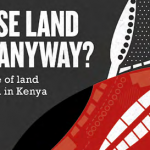This article was first published by Business Daily and is reproduced by kind permission of the editors and the author.
Kenyans are well aware of the tensions and dynamics around land ownership in the country. The contentious issues around land are often linked to tribal and ethnic tensions; land issues informed the ferocity of post-election violence in 2007/8. But beyond being a tension between different communities, land ownership issues are hampering the country’s economic development.
Firstly, land directly affects agricultural productivity, or the lack thereof. At the moment, statistics indicate that small-scale farming accounts for at least 75 per cent of the country’s total agricultural output and 70 per cent of marketed agricultural produce. In short, most of the meals eaten by Kenyans come from a smallholder farmer working away on his or her small patch of land.
But one of the reasons why agricultural productivity is so low in the country is precisely because the vast majority of farmers are on over-worked, nutrient-depleted, small pieces of land that have been subdivided for generations. The situation is made more complex by the fact that many smallholder farmers do not have the title deed to the land. So while there may be a general acknowledgement by their community that the land they farm is indeed theirs, the costs related to registering land and acquiring titles are too high for most smallholder farmers.
As a result the farmers do not legally own the land and thus cannot use it as collateral to access credit that could allow them to make improvements to their farming practices. More importantly, smallholder farms cannot be conglomerated in one large piece that can be more efficiently farmed with higher levels of mechanisation, productivity and profitability. As a result, Kenyan agriculture sector is stuck in a rut with no foreseeable way out. If anything, the situation will worsen as the average size of land holdings continues to fall due to the cultural practice of subdividing the land for each son in the family to inherit.
Manufacturing is also affected by Kenyan’s land problem because even if a company wants to expand operations to another part of the country, the process of procuring land on which the factory or plant will be built is daunting.
The lack of legal title depresses demand for land because potential buyers do not want to negotiate the complexities of proving ownership. No one wants the nightmare of procuring a piece of land that is then mired in contention that prevents business activity from moving forward. Further, the lack of legal ownership also makes it difficult for land holders to come together and combine smaller pieces of land into a mass that can more effectively attract capital investment. In short, both supply and demand are affected by the land question.
Finally, infrastructure development is more costly, mired in delays and incredibly complex because of land issues. In some cases communities do not agree with the valuation of land engendering renegotiations, in other cases absentee landlords make the process of land acquisition long and arduous. However, the most complex is where communities live on what they consider their ancestral land but the land is legally owned by another person or entity.
Anzetse Were is a development economist and weekly columnist for Business Daily Africa.












